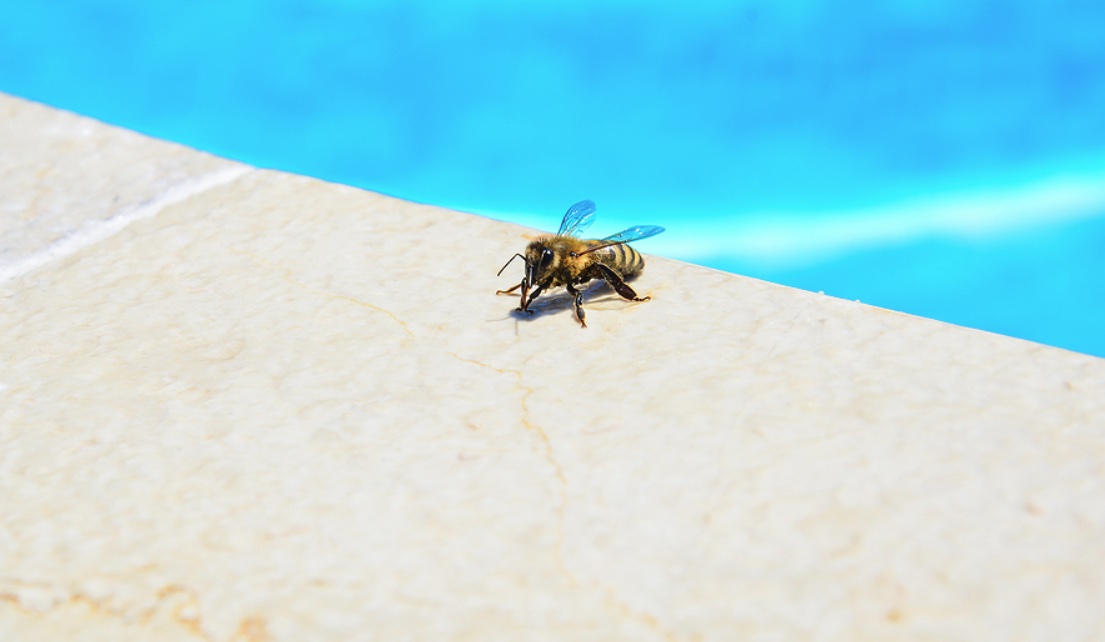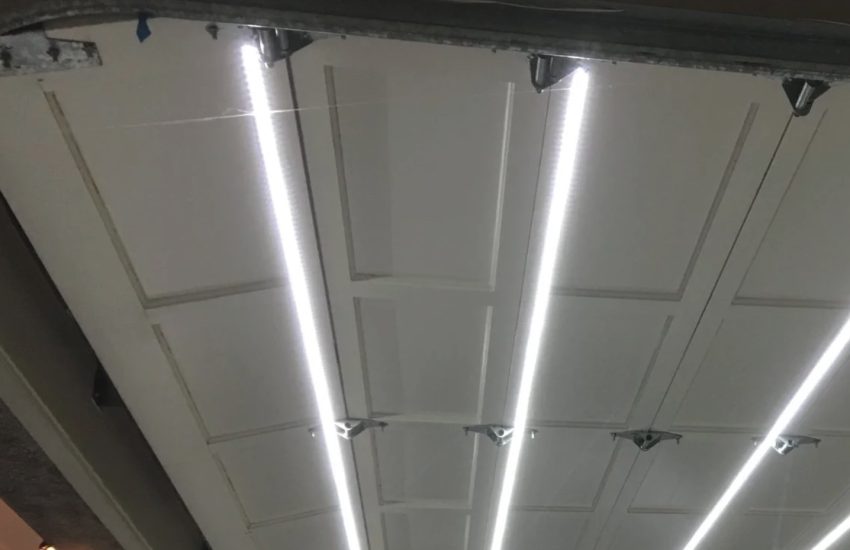How to Keep Bees Away from the Pool
With the summer and warm weather here, it’s not uncommon to see stinging insects such as bees and wasps invading the pool. Unfortunately, bees can make outdoor activities such as lawn mowing, swimming, or simply hanging out in the yard difficult. Stings can be life-threatening to both humans and pets.
Thankfully, there are numerous ways you can remove and keep bees away from your pool. Some possible solutions include spraying insect repellents, removing attractants, and cleaning tricks.
We will detail the most common methods to deal with bees around your pool and keep them away in the long run.
Why are there so many bees around my pool?
Several reasons can attract bees, and other insects to hang around your pool. They include:
Source of water
Your pool is a large source of water for the bees. They will come to the pool to quench their thirst and that of the younger bees back in the hive. They will also carry the water back to their hives to dilute the honey to feed their young ones.
Hive air conditioning
Bees in the swimming pool, especially in the hot weather, are like humans; they are cooling off. They will also carry water from the pool to their nests to maintain hive temperature.
Several bees will leave their hives, look for water sources and bring the water back to the hive. As the water evaporates, it cools off their hives, making them habitable in the heat.
Chlorine smell
Another reason is the chlorine smile in your pool will attract the bees and other stinging insects. However, bees use their eyesight to find flowers and evade enemies; but it’s not great at finding water.
So they rely on their sense of smell. They are also attracted to water that contains algae, slime, fungus, and mud.
Food and drinks
People tend to hang around the pool a lot more during hot weather. It, therefore, smells of food, barbecue, and sweet drinks, likely attracting the bees to your backyard. Food from your garbage bin can also attract the bees.
How to keep bees away from the pool
Now that you know why bees are in your pool water, here’s how you can effectively eliminate them and keep them away.
Remove drinks, drinks, and other attractants.
One of the first things to do to remove bees from your pool area is to remove anything that could attract them. This includes drinks, food, garbage bins, feeders, and colorful things. You should;
- Clean up spills from sugary drinks.
- Dispose of plates and drink containers.
- Cover the garbage bin, keep them clean and move them away from the pool.
- Ensure all the drinks and food remain covered with plastic wrap or aluminum foil if you’re hosting around the pool.
- Move any bird feeders away from the pool and add nectar guards.
Cover your pool
It’s best to cover your pool when you’re not using it. If the bees can’t access the pool, they will go elsewhere for water. The cover will also keep off leaves, debris, and twigs from your pool.
Introduce an alternative water source or attractant
To keep the bees off your pool, try luring them away from the pool by providing them with another water source. This method has proven effective for honeybee control in desert homes.
Fill a shallow container with sand or rocks and pour pool water slightly above the level of the sand and add some Epson salt or honey; then place the trough away from the pool. This will give them a safe drinking source away from the pool. Alternatively, you can install a water fountain away from your pool.
You can also plant some bee-friendly plants around the water source to divert them from the pool. You can use plants such as
- Marigolds
- Sunflowers
- Starflowers
- Black-Eyed Susans
- California Poppies
- Goldenrod
- Coneflowers
It’s best to keep the pool covered during this process for better results.
Relocate bee-friendly plants from your pool area
Bees are attracted to bright-colored flowers, so if you have these plants around your pool, they could attract the bees to the pool area. Try moving your plants away from the backyard or remove them completely. These plants will naturally divert them from the pool.
Grow natural bee deterrent plants
Bees love many types of flowers, but they keep away from certain plants. Try planting natural plants that repel bees around your pool area. These plants are easy to maintain, smell pleasant to humans, and will keep bees away from your backyard.
Additionally, these scents repel wasps and mosquitoes too. So what smells do bees hate? They include:
- Lemongrass
- Mint
- Sage
- Thyme
- Rosemary
- Cucumber
- Wormwood
- Eucalyptus
Avoid growing cloves and lavender plants. Although bees do not like their scents, they have bright flowers that would draw them in. Also, you can plant pitcher plants, which control the insect population. They will attract, trap and eat bees but not repel them.
Use dryer sheets
Dryer sheets contain similar scents to lemongrass, which is a bee repellent. So hang a few dryer sheets around your pool to keep bees away outside. Remember to replace these regularly as their scent wears off over time.
Use mothballs
Like dryer sheets, mothballs contain a scent that bees and wasps dislike and will stay away from. So add a few moth balls in a decorative bag and hang it around the pool area to deter the bees.
Although mothballs have an unpleasant smell, the smell of pool chemicals will mask this and make it tolerable for humans.
Install a decoy wasp nest
Try installing decoy wasp nests in various areas around the pool. Bees hate wasps and will likely avoid areas with existing wasp nests. Wasps are also very territorial, so the decoy nest will naturally deter them from coming around your pool.
Call a beekeeper
If you notice the bees have made a nest around your pool, the best solution is to call a professional beekeeper. They will safely remove the nest and relocate them, so you end up with a bee-free pool.
What can I spray around my swimming pool to keep bees away?
There are several off-putting fragrances you can spray around your pool and backyard to deter the bees away. These scents include:
- Herbs like peppermint, thyme, eucalyptus, and spearmint: Add a generous amount of essential oil containing any of the mentioned herbs in a spray bottle and spray it around furniture and objects around the pool.
- Oils such as lavender oil, olive oil, vegetable oil, or citronella oil: You can apply these oils on your skin when hanging around the pool to keep bees away.
- Mix clove, geranium, and lemongrass in a spray bottle and dilute the mixture slightly with water or keep it potent. Then spray the mixture around the pool periodically to keep bees away.
- Water and dish soap mixture: Mix one part water and one part liquid dish soap and spray it on the bees. This won’t kill them; it will soak their wings and keep them away in the future. However, be careful because spraying at a bee is dangerous, and they could retaliate by stinging.
Are the bees around my swimming pool dangerous?
Honey bees are not highly dangerous under most circumstances. But many people are simply afraid of bees, while many others are allergic to their sting. In addition, bees away from their nest are less defensive and are unlikely to sting unless provoked.
Also, although bees come around the pool for water, human movement and water jets make them feel threatened and sting.
The biggest threat is when getting swarmed by multiple bees and not one. However, some people have mild reactions to bee stings, while for others, one sting could be deadly. Therefore, keeping bees away from your pool is best to protect your family and pests from bee stings.
How to avoid being stung by the bees around your swimming pool
Prevention is better than cure. Here are some tips to help you avoid being stung by bees while hanging around your pool:
Avoid strong scents
Although bees are not attracted to human skin, applying perfumes, lotion, hairspray, body sprays, and sunscreen with strong flowery scents will draw them around you.
Avoid bright colors
Avoid wearing colorful clothing, swimsuits, and towels around your pool. This is because colorful clothes can confuse and attract bees around you. In addition, bees have a wider range of colors than humans. So what looks like a pale shade to the human eye may be a bright and colorful shade to a bee.
Wear a hat
Bees have an increased sense of attraction towards hair and fur as these are traits of honey hijackers. So wear a hat while hanging around the pool to avoid looking like a threat to the bees. For this reason, pets and cats should avoid hanging around areas with bees to avoid being stung.
Remove nests around your pool
Decks, porches, tree branches, and wooden fences are great places for bees to nest and build a hive. If you notice bees hanging around your pool, you should first ensure there are no hives around your compound.
Bees are territorial and aggressive. You can hire a professional beekeeper to look for the hive and relocate it safely.
Protect your feet
Suppose you have a lawn around your pool; it’s best to avoid walking barefoot around the pool or on lawns, especially flowering lawns. Sometimes bees can nest in the ground, and if trodden on by accident, they may sting.
Keep yourself clean
If you’re eating or drinking outdoors around the pool, try as much as possible to keep your hands clean and dry, especially the children.
Bees are attracted to sweet foods and drinks, so ensure your face and hands are free of sweet, sticky foods. Have a packet of wet wipes with you to clean away spillages.
Apply DEET-free bee repellent
If bees are fond of your pool, try applying DEET-free(plant-based) insect repellent on your skin to deter the bees. You can also spray some repellent around your pool furniture to keep them away.
Conclusion
Bees are essential to the ecosystem, so we do not recommend any method that involves killing them. Before calling exterminators, try natural repellents like decoys, mint, and lemongrass near the pool, and remove attractants like colorful plants away from the pool.
For better results, we encourage using several methods to ensure bees and other stinging insects stay away from your pool.


